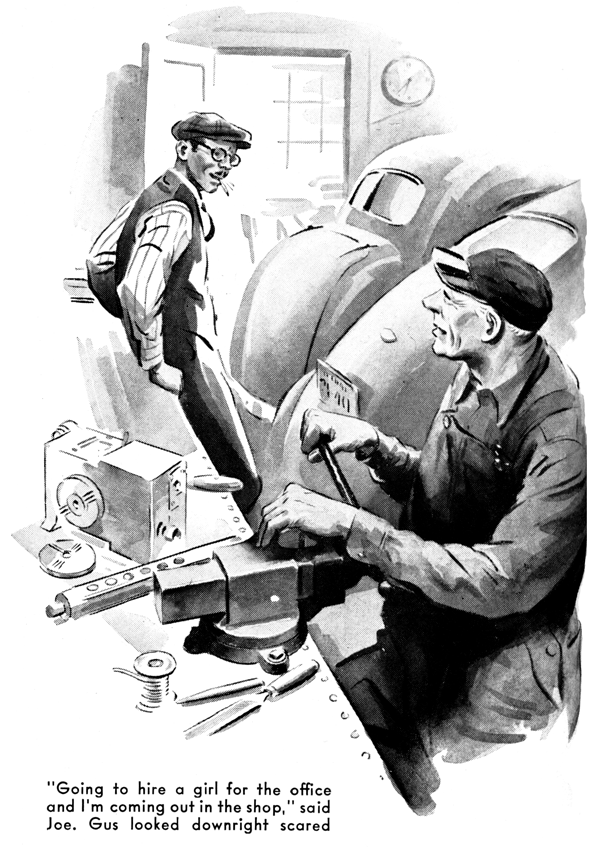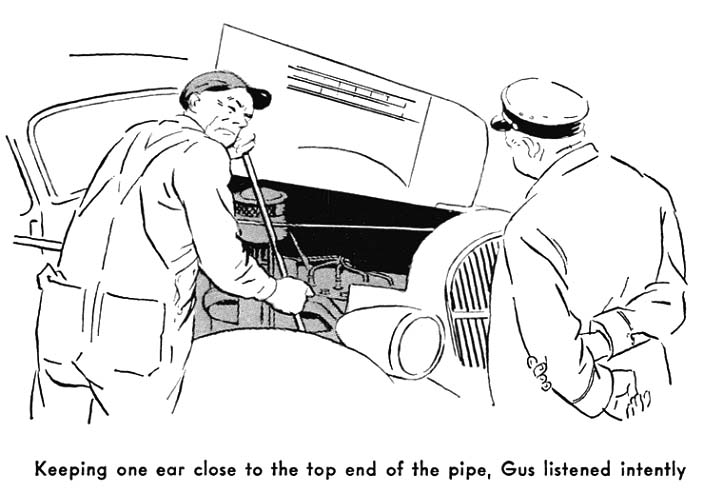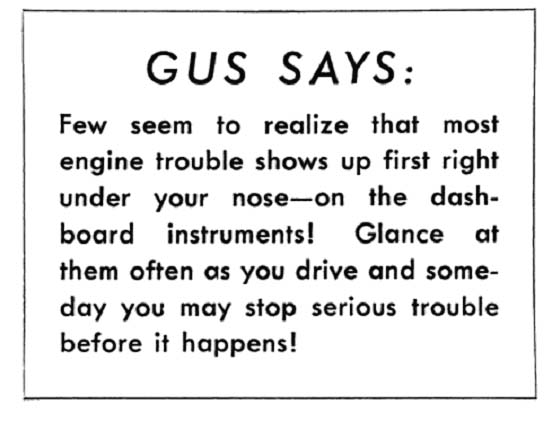December 1941
GUS KEEPS 'EM ROLLING
by Martin Bunn

"I dunno what we're going to do," Joe Clark gloomed to his Model Garage partner, Gus Wilson. "It was tough to lose Harry to the Army. Now he's gone and got himself into that officers' training school, so he'll stay in the service a long time, and when he comes out it isn't likely that he'll be willing to come back to work as a grease monkey. Ever since he left, every half-way-decent mechanic we've managed to get hold of has either enlisted or been blown away by the draft or has quit us to go to work in some defense industry.
"Oh, I ain't kicking -- I'm just as patriotic as the next fellow. But how are we going to keep this business running? That's what I'd like to know! Since folks have realized that they're likely to have to make their cars do for a long time we're getting more business than we've ever had before. We need two good mechanics right this minute -- we could use three. And what can we get? Nothing but kids fresh out of high school. What the heck are we going to do, Gus?"
Gus looked up from the complicated gadget he had on his workbench -- it's an idea that he's working out experimentally before he sends it to the National Inventors' Council down in Washington with what we all think is the well-founded hope that it will be a help in the good work of making Hitler less of a nuisance than he is now. "What are we going to do?" Gus repeated seriously. "We're going to do the only thing we can do -- keep right on trying our darndest to keep our customers' cars rolling. That's our job, Joe, and it's an important job. We'll just have to do the best we can with whatever sort of help we can get. Quit your worrying and hire one of those kids you've been interviewing. It might happen that I could turn him into something useful."
"O.K.," Joe agreed, without enthusiasm. "And I'll tell you something else I'm going to do. I'm going to hire a girl to do most of the work in the office, and I'm coming out here in the shop. Lord knows that I don't pretend to be a mechanic, but there must be some things I could do."
Gus looked downright scared. Joe's few attempts at mechanical work have been far from successful. "That's a swell idea, Joe," he said soothingly, "but for the time being it would be a lot more sensible for you to keep on running this outfit from the front office. That's your job. If the time comes that I need you out there, I'll tell you so. That sounds like Doc Foley's horn."
It was, and a moment later Dr. Foley came in with a worried look on his usually cheerful face. "There's something seriously wrong with my car," he announced. "I think it must be the fuel pump."
"What are the symptoms, Doc?" Gus wanted to know.
"Yesterday afternoon," Dr. Foley told him. "I was doing about forty when I came to that steep hill four or five miles up the road. Half way up it my motor began to labor, and although I stepped on the gas hard it went dead before I got to the top. From the way it died I thought I was out of gas, but the gauge showed that the tank was three quarters full. I took a look under the hood, and so far as I could tell everything was all right -- not that I know much about motors. Anyhow, when I got back in the car and stepped on the starter, away she went as nice as you please!
"I was on my way to see the Dawsons' little girl -- she's got the measles. Dawson is a fellow who enjoys fussing with his car, so I told him what had happened. After he had done some checking on my motor, and found that it was running perfectly, he said that probably a speck of dirt had clogged one of the carburetor jets and then worked its way out again, and that I wouldn't have any more trouble.
"I forgot all about it until the same thing happened again today. In fact, it happened three times while I was on my rounds. I know it's after your working hours, but I have a lot of calls to make now that young Dr. Smyth has gone in the Navy and I've taken over his practice, and I just can't afford to be driving a car that I can't depend on."
"Drive her right in, Doc," Gus invited. "Working hours are whenever I'm here. That goes for the duration!"
By the time Gus had locked his gadget in the office safe Dr. Foley had driven his car into the shop.
Gus looked at its speedometer. "Thirty-six thousand four hundred," he read. "How long have you had this fuel pump, Doc?"
"Why, it's the one that came on the car," Dr. Foley told him. "Anything wrong about that?"
"Maybe not, and maybe there is," Gus said. "Seems to me that it's a good idea to install a new pump every 20,000 miles or so -- just to be on the safe side. There's nothing that makes a man feel more helpless than to have his fuel pump go bad when he's ten miles from nowhere in the middle of the night, and leave him with no way of getting gasoline from his tank to his carburetor. But maybe your trouble isn't in the fuel pump at all. I'll have to do little checking."
He cleaned a small amount of sediment out of the pump bowl. Then he replaced the bowl, opened the gas line from the pump to the carburetor, and stepped on the starter. Gasoline spurted out of the pump.
"Your fuel pump is O.K.," he told Dr. Foley, "but I still think that it would be a good idea to put in a new one, considering the mileage. The chances are that the trouble is in the carburetor."
He cleaned out the short line from the pump to the carburetor. Then he took the carburetor apart and blew its jets clean with compressed air. Then he reassembled carburetor, and again stepped on the starter.
The engine took off promptly and ran smoothly.
"It seems all right now," Gus said. "But it seemed all right a couple of times before, and then went dead on you. Got time for me to take her out for a little road test, Doc?"
"Sure, go ahead," Dr. Foley told him.
Gus was gone for the better part of a half hour. "How was she? All right?" the doctor asked when he drove back into the shop.
"Nope -- she's still all wrong." Gus said. "Did the same thing with me that she did with you. The engine drifted to a stop on a hill, but took off fine again when I stepped on the starter. You'll have to let me do some more checking this evening, Doc. Right now I've got to hustle down to the Park House to get my dinner, or the dining room will be closed. I'll drop you off at your house on my way, and I'll bring your car around to you on my way home tonight. If you should get a hurry call before I've got it fixed, phone me and I'll bring my bus around for you to use, O.K.?"
When Gus got back to the Model Garage after he'd eaten a hurried dinner he found the lights burning in the office and Joe Clark busy over his ledgers, and the lights burning in the shop and Ez Zacharias, his postman's cap on the back of his shaggy head, chewing tobacco industriously and gloomily contemplating his mud-plastered R.F.D. sedan. "Joe said you'd be back," Ez explained. "Say, Gus, I'm right behind the eight ball. My ol' bus sounds like all her connecting-rod bearings was burned out. Take a look at the ol' girl, will you?"
"I will if you want to wait until I've found out what's the matter with Doc Foley's car, and fixed it up," Gus told him. "His job's ahead of yours, and I promised it to him for tonight."
"I got lots of time," Ez assented comfortably. "The P.O. Department ain't got us R.F.D. fellers deliverin' mail at night -- not yet, anyhow. I'm a-takin' this here World War Two easy-like -- they danged near wore me down over there in France in the first one. Course if them Nazis ever came over here I'd feel different. I'd get me a machine gun and show some of those kids who're swaggerin' around in uniforms how we used to -- "
He went on sounding off while Gus, paying mighty little attention to him, rechecked the fuel pump and carburetor of Dr. Foley's car. Again he could find nothing wrong with either.
Finally Ez interrupted his monologue.
"What's the matter with that crate?" he demanded. Gus described the difficulty.
"Huh!" Ez grunted. "Bet it's the carburetor. Carburetors are the cause of about three quarters of the trouble you have with automobiles. They're like kids' stomachs and hosses' bellies! Hey, look here! When you took the cover off that carburetor I seed that the float bowl was near empty. That ain't natcheral. What's the cause of it, hey?"
Gus stared at him. Then he stared at the float bowl. "You're right by gum!" he said. "I never thought of that. You are of some use, after all, Ez! Let's see, now."
He examined the float bowl carefully. Then he laughed. "That's one on me," he acknowledged. "See what's wrong, Ez? The float needle is worn to a wedge fit. It sticks so tight when the float bowl is emptied that it doesn't open when the float arm pressure is removed. Then the engine stops because it isn't getting any gas -- and then when you step on the starter the carburetor gets a little jar which loosens the float needle, the gas flows again, and the engine starts. I'll just lap out the valve seat a little with some very fine valve-lapping compound, and Doc won't have any more trouble with it. First time I've ever run into that one. You're some trouble-shooter, Ez!"
Highly pleased with himself, Ez chewed his tobacco placidly and amused himself by scoring an occasional bull's-eye on the waste box while Gus put the valve into workable condition. Then he went into the office and telephoned Dr. Foley. "Your car's O.K. now," he told him. "It wasn't the fuel pump, after all, but it would be good business to put a new one in just the same. How about it?"
"Whatever you say," the doctor told him.
Gus came back into the shop and installed a new fuel pump. Then he turned to Ez. "Now for that wreck of yours," he said. "What did you say is the matter with it this time -- a burned out connecting-rod bearing? Let's hear your sad story."
"She's sad, all right," Ez said, grinning.
"This morning on my route I had to tramp on the gas pretty hard to make a steep hill, and there was a rap somewheres in the car's innards. Every hill I went up after that the rap got louder. It sounded to me like a connecting-rod bearing gone flooey."
Gus raised the hood. "Start her up, will you?" he said. Ez climbed into his car and started the engine. Gus listened intently for half a minute.
"There's a rap, all right," he decided, "but I can't tell where the noise is coming from."
He went over to his workbench and came back with a three-foot length of iron pipe. "Speed her up a little," he told Ez. Keeping one ear close to the upper end of the pipe, he held its lower end in contact with various parts of the engine. After a few minutes he raised his hand. "Switch her off," he told Ez. "There's nothing the matter with your bearings. That rap is coming from -- or from somewhere near -- your fuel pump. Ever had any trouble with it?"
"I've had trouble with pretty near every gol-dern gadget anybody's ever stuck on an automobile," Ez declared feelingly. "But I ain't never had any trouble with this perticuler fuel pump."
Gus examined the pump. "Clearance between the cam and the fuel-pump arm might cause that rapping," he said, "but that's not at all likely. Let's see, now your fuel pump and your vacuum pump operate from the same rocker arm, but work off two different links in the fuel-pump housing. Start your engine again, Ez."
Ez did as he was told. "Switch her off," Gus said after a few seconds. "I've got it. Those two links are hitting against each other! That's what's been making that noise. Probably the trouble is caused by a broken diaphragm.
"So that's it, hey?" Ez said. "I ain't a very good guesser, am I? Well, I guess puttin' in a new diaphragm ought to fix it up."
"It might," Gus said. "And then again, it mightn't. You just saw me put a new fuel pump on Doc Foley's car. Your bus needs one a lot worse than his does."
"I mights knowed you'd manage to sell me somethin' before I got outta this place," Ez grumbled. Then he grinned broadly.
"Sure -- put it on, Gus. Whatever you say about automobiles is jest as good as Scripture to me!"
After Ez had driven away Gus glanced at the shop clock. It was close to eleven. He went into the office and found Joe Clark nodding over a ledger. Poking his partner playfully in the ribs he told him that he'd better wake up and go home.
Joe yawned extensively. "How about you?" he wanted to know. "You've worked about thirteen hours today."
Gus grinned at him. "Don't worry about me," he said. "We've got a lot of good customers who have a lot of not-so-good cars, and we've got to keep 'em rolling -- that's our job! Drive Doc Foley's car over to his house on your way home, will you, Joe? I was going to do it myself, but I've just had a bright idea for that gadget of mine, and I want to do a little work on it before I hit the hay."
END
L. Osbone 2019

